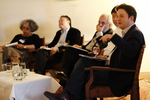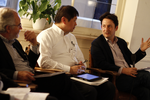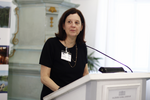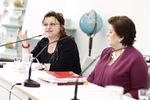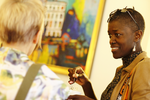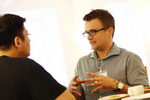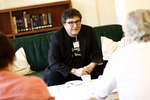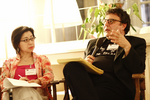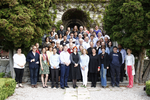
Public and Private Cultural Exchange-Based Diplomacy: New Models for the 21st Century
The fifty-four participants of the Salzburg Global Seminar Session 490 on “Public and Private Cultural Exchange-Based Diplomacy” met at an auspicious moment in the evolution of international cultural engagement. As comment after comment at the Seminar made clear, there is a palpable sense of opportunity in the field. The tone and texture of cultural discourse, the range of included voices in creative practices, the organizational and technological infrastructure for conducting transnational cultural exchanges, are all undergoing a sea change - and generally for the better.
A report outlining the thinking that took place in Salzburg focusing on the future of international cultural engagement is now available, along with three white papers that were commissioned for the session and which provide much food for thought on the following themes: new roles for public and private organizations in future cultural exchange, global shifts in power and related changes in the parameters of cultural engagement, and the impact of social media and new communication technologies on cultural dialogue in the 21st century.
Abstract
At the onset of the 21st century, cultural diplomacy is encountering new challenges as policymakers, artists, and cultural leaders adapt to a rapidly changing global environment. This change is being driven by multiple factors, including the emergence of a multi-polar world, the growing influence of rapidly developing nations in Asia, South America, and the Gulf, increasing urbanization, rising educational levels, and accelerated scientific and business innovation. At the same time, the arts are experiencing seismic shifts emanating from more pluralistic and inclusive definitions of culture, a greater preponderance and acceptance of arts activity at all levels, and increased participation in the arts through broadcast, digital, and social media. Making matters even more complicated, our world is being recast by forces of cohesion and division. While digital technology and integrated markets are interconnecting global societies as never before, political, cultural, and religious tensions continue to create divides. Thus, the landscape for cultural diplomacy has changed dramatically and, consequently, the priorities and methods of cultural diplomacy need to change with the times and align more fully with new modes of cultural and political engagement.
The revitalization of cultural engagement will require new energies and forms of collaboration between artists, cultural organizations, governmental and intergovernmental bodies, private foundations, corporations, and other citizen groups. The purpose of this Salzburg Global Seminar session is therefore to conduct an informed exchange among these constituencies, by bringing together policy experts, artists, cultural leaders, heads of cultural institutions and foundations, corporate leaders, and others committed to international cultural engagement to explore the evolving purposes, forms, and tools of cultural diplomacy in the 21st century. Plenary sessions and working groups will focus on the following themes: new pathways for government-sponsored cultural diplomacy; cultural organizations on the frontlines of arts exchange; new roles for NGOs and the private sector; and cultural diplomacy and exchange in the digital age. The convening is intended to foster a fresh exchange of ideas and to develop new rationales and approaches for cultural engagement at a pivotal moment in the evolution of cultural diplomacy.
Download the Atmosfair Certificate presented to the Salzburg Global Seminar, for climate protection
Salzburg Global Seminar Session 490 was developed jointly by the Salzburg Global Seminar and the Robert Sterling Clark Foundation.
The Salzburg Global Seminar is grateful to the Robert Sterling Clark Foundation for its generous support.
Additional support was provided by The Edward T. Cone Foundation, Ford Foundation, The Forty-Second Street Fund, The F.B. Heron Foundation, Japan Foundation, The Andrew W. Mellon Foundation and The Trust for Mutual Understanding.
The Seminar’s appreciation is also owed to the co-chairs and panelists for donating their time and expertise. The Seminar gratefully acknowledges the assistance of all participants, whose diverse experience and ideas informed the session and the report.
Robert Sterling Clark Foundation:
For more information on the Robert Sterling Clark Foundation and their work:
http://www.rsclark.org/
Co-Chairs




Session Report and White Paper Authors
Margaret Ayers, President, Robert Sterling Clark Foundation, New York, New York, United States
Margaret Ayers has served as president and CEO of the Robert Sterling Clark Foundation since 1979. From 2007 through 2009, she conducted research on public and private disinvestment in international arts engagement and wrote a major report entitled Promoting Public and Private Reinvestment in Cultural Exchange-Based Diplomacy. The report has been made available to government and foundation officials and serves as the bedrock of the RSCF’s new arts program. Ms. Ayers also serves on several boards of non-profit organizations including the New York Foundation for the Arts. A graduate of Douglass College, Rutgers University, she majored in political science, and is a Fellow of Session 453, Achieving the Freer Circulation of Cultural Artifacts (2008).
Joni Cherbo, Executive Director, Resource Center for Cultural Engagement, New York, United States
Joni Cherbo is currently executive director of the Resource Center for Cultural Engagement (RCCE). Together with its partner organizations Visiting Arts, UK and Libros, UK, RCCE has developed the WORLD CULTURES CONNECT web portal to connect the arts community worldwide. She developed the inaugural National Arts Policy Roundtable for Americans for the Arts, was on the Research Advisory Committee of the Center for Arts and Culture, Washington, DC., and is a senior research fellow at Ohio State University. She has initiated, organized and lectured on the arts at various convenings, taught at a number of universities in the New York City area, and served on boards and committees of many cultural institutions, and written extensively on a wide range of topics.
Joshua Fouts, Executive Director, Science House Foundation, Science House, New York, New York, United States
Joshua Fouts is executive director of Science House Foundation. He is a senior fellow for Science Diplomacy, Culture and Education at the Center for the Study of the Presidency and Congress. He has worked for more than twenty years as a leader in the use of technology and science for cultural relations. His internationally recognized collaborative research projects with Rita J. King have focused on novel uses of new technology for education transformation and cultural collaboration, especially in the digital sphere. He co-founded and directed two think tanks at the University of Southern California Annenberg School.
Yudhishtir Raj Isar, Professor of Cultural Policy Studies, The American University of Paris; Eminent Research Visitor, Institute for Culture and Society, University of Western Sydney, Australia
Yudhishthir Raj Isar is an analyst, consultant, public speaker and writer whose work encompasses cultural theory, experience and practice. He is professor of Cultural Policy Studies at The American University of Paris and eminent research visitor at the University of Western Sydney, Australia (2011-2013). He is trustee of or advisor to diverse cultural organizations in Europe, the US and India. Previously he served as cultural specialist at UNESCO, most notably as executive secretary of the World Commission on Culture and Development and director of cultural policies. He was the first executive director of the Aga Khan Program for Islamic Architecture at Harvard University and MIT. Mr. Isar was educated in India and France.
Rita King, Vice President of Business Development, Science House, New York, New York, United States
Rita J. King is executive vice president of business development at Science House and the creator of The Imagination Age. She founded Dancing Ink Productions, and most recently co-directed IMAGINATION: Creating the Future of Education and Work, an interactive project for educators focused on science, technology, engineering, the arts and mathematics. She is senior fellow for Social Networking and Immersive Technologies at the Center for the Study of the Presidency & Congress, a former innovator-in-residence at IBM Virtual Analytics Center, and a former senior fellow at the Carnegie Council for Ethics in International Affairs. She is currently serving as futurist at NASA Langley’s think-tank, the National Institute of Aerospace.
András Szántó, Writer, Arts Consultant, New York, New York, United States
András Szántó is a writer, researcher, and consultant in the fields of art, media, cultural policy, and philanthropy. He is the former director of the National Arts Journalism Program at Columbia University, where he also directed the NEA Arts Journalism Institute, and he has been a lecturer on arts management at the Sotheby’s Institute of Art in New York. He has designed conferences, conducted research, and launched initiatives for major foundations, museums, arts organizations, and commercial enterprises. He is the co-author and editor of five books, and his reporting and commentary have appeared in The New York Times, The Los Angeles Times, The Wall Street Journal, The Art Newspaper, and other various publications. In 2003, he helped organize an international conference on cultural diplomacy at Columbia University titled Arts & Minds.
Downloads
Session Report
Click here to download the report
List of Participants
Click here for the complete list of participants
Session Program
Click here to download the program
Session Documents
"A new beginning for Europe - the EUNIC network" (by Horia-Roman Patapievici)
published by IFA
Re-imagining Public-Private Roles in International Cultural Engagement for the 21st Century
White Paper distributed in preparation for discussion on: Re-Imagining Private Roles in International Cultural Engagement for the 21st Century
The Future of Art: Our World as an Interconnected GalleryWhite Paper distributed in preparation for discussion on: Global Communications and the Rise of Social Media: The Future of International Cultural Engagement
The Wealth of a Multipolar World: New Horizons for Cultural Exchange?
White Paper distributed in preparation for discussion on: Shifting Economic Power: New Parameters of Engagement In a Multipolar World
White Papers
The following white papers were written for the session:
Re-imagining Public-Private Roles in International Cultural Engagement for the 21st Century (by Joni Maya Cherbo)
The Future of Art: Our World as an Interconnected Gallery (by Rita J. King and Joshua Fouts)
The Wealth of a Multipolar World: New Horizons for Cultural Exchange? (by Yudhishthir Raj Isar)
Related Internet URL
Testimonials
"This seminar was more than just an academic event. It was a profoundly human experience that I -- and I am sure my colleagues as well -- will long remember."
Fellow from USA
"I want to thank everyone for such a stimulating and congenial meeting. For those of you whom I had a chance to converse with, it was a pleasure getting to know you, and for those I did not, we shall talk next time. As time goes on, I do hope that actions and progress for international cultural exchange takes shape. Arts and culture is how our societies, indeed our civilizations will be measured, not by our wars and racism. It remains of the utmost importance that we all be optimistic at this time, especially, when the political momentum seems to have moved towards a bellicose and narrow state of mind. We are the protectors of Beauty and Knowledge. I want to thank the people at Schloss Leopoldskron for their hospitality, intelligence, and the mission they are advancing in an oasis of discourse and thought."
Fellow from USA
"With 50 participants from more than 25 countries, the Session was "the" most insightful and meaningful seminar of this sort I have ever attended. From renowned artists to high-ranking cultural officials to cutting-edge experts on technology, the session was truly eye-opening. I sincerely hope that the Salzburg Global Seminar will continue to host a session on this vitally important topic and your continuing support and engagement will be most appreciated."
Fellow from Japan
"It was a pleasure and honor to attend the Session 490 which allowed me to learn so much about what is happening in the various parts of the world in the areas of international cultural engagements and meet wonderful people who make great contribution to bring people closer to each other."
Fellow from Australia





